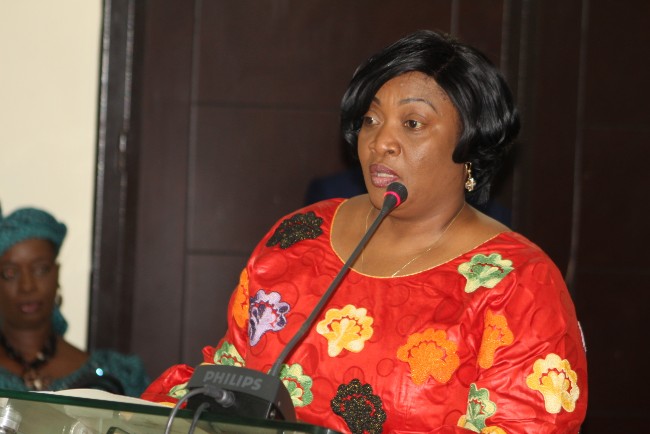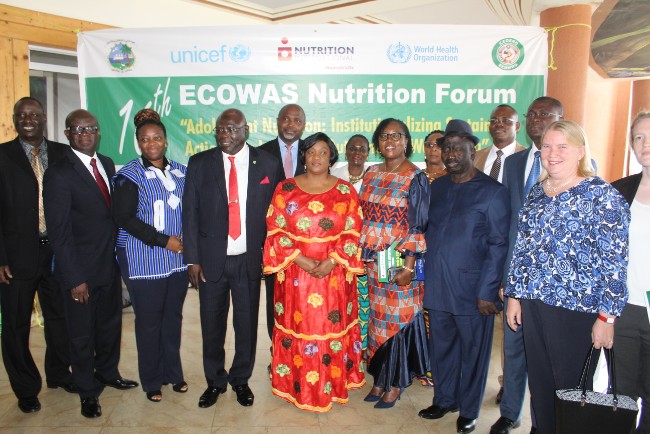Liberia: Vice President speaks at ECOWAS nutrition forum

Vice President Jewel Howard Taylor delivers the opening address at the 16th ECOWAS Nutrition Forum in Monrovia, Liberia on Monday, November 18
I am grateful to the Almighty God, for journey mercies which allowed all delegates to arrive here safely in Monrovia for this FORUM; and for granting the opportunity and atmosphere of peace under which we sit today. To HIM alone belongs all GLORY.
It is a pleasing duty today, on behalf of the President, H. E. George Manneh Weah, the Government and People of Liberia, to warmly welcome this august assembly to Monrovia; for the hosting of the 16th ECOWAS NUTRITION FORUM.
Permit me a moment to thank His Excellency, Jean-Claude Kassi Brou, the President of the ECOWAS Commission through his Special Representative in Liberia, the Director General of WAHO, Professor Stanley Okolo and our Development Partners for the financial and technical support given, which has led to the successful hosting of this meeting; and finally my special gratitude to the Local Organizing Committee and the International Planning Committee for making sure the plans for this event were carried out properly; as evidenced by the overwhelming presence of all actors gathered here.
Excellencies, Distinguished Ladies and Gentlemen; history recalls that it was during the last ECOWAS Nutrition Forum in Guinea Bissau in October 2017, that Liberia’s offer to host the 16th Forum was unanimously accepted by all. Subsequently in November 2018, Liberia successfully hosted the mid-term review of the implementation of the recommendations of the 2017 Guinea Bissau Forum.
Thus we are gathered here today for the hosting of the 16th ECOWAS Forum, organized under the theme “Adolescent nutrition: institutionalizing sustainable actions for improved outcomes in West Africa”. This theme is appropriate for our region for it considers 2 critical topics – food security under appropriate “nutrition” and its impact on the majority of our adolescent population. It has been proven that Child under-nutrition is the leading cause in up to 45% of deaths for children under five; which explains the urgent need for a regional focus on programs for children, pregnant women and mothers.
Your Excellencies, Distinguished Ladies and Gentlemen;
As you know, West Africa has a large youthful population as a result, even small percentages of malnourished adolescents translate into large absolute numbers. In our region, studies indicate that about 1.3 % of all adolescents are obese; 3.4 % of adolescent girls are underweight; and just over 50 % of girls aged 15-19 years are anaemic.
In West and Central Africa, it is estimated that about 3.5 % of girls give birth before the age of 15 years, and nearly a third before 18 years; whilst other adolescent girls may be coerced to get rid of unwanted pregnancies with potentially adverse consequences. To further compound the numbers, in many countries, education of the girl child is cut short because of early marriages, unplanned pregnancy, sexual and gender based violence and FGM.
It has been also proven that Adolescent or teenage pregnancy is associated with poor birth outcomes, child and maternal under nutrition; as a result adolescent mothers are more likely to be poorly nourished, have lower education, have less access to health services be stigmatized, and practice poor complementary infant feeding practices. With this trend, ensuring a healthy mother with a healthy nutritional status before, during and after pregnancy is, therefore, crucial to ensuring healthy newborns and infants.
Outside of pregnancy, overweight and obese adolescents are at a greater risk of developing nutrition-related non-communicable diseases in later life at an earlier age than their non-obese peers. Increasingly, peer pressure is pushing some adolescents to engage in unhealthy habits such as smoking, alcohol abuse, illicit drug use, and violence – with harmful consequences on their health and nutritional status.
As a result of these occurrences, outside of health, malnutrition exacts a huge economic toll on individuals, households, communities and countries. It costs African countries about 3%-16% of their Gross Domestic Product (GDP) annually.
Yet, for every US $1 we invest in reducing chronic childhood under nutrition, we can expect a US $16 return. Interventions to reduce malnutrition will therefore ensure healthier adults who are able to contribute to the family, boost economic outputs, reduce school drop-outs and break inter-generational poverty.
Your Excellencies, Distinguished Ladies and Gentlemen;
Addressing the health and nutrition of adolescents is multidimensional; and depends not only on a healthy food system, but also, on public policy choices. Fortunately, there is a growing global and international momentum to tackle malnutrition. Nutrition is also included in the sustainable development goal (SDG) targets, thereby, highlighting the importance of nutrition to national socio-economic development.
Thankfully there now exists, regular monitoring of the performance of countries towards meeting global targets in nutrition and non-communicable diseases; and the African Development Bank has championed accountability through the development of scorecards. Today, fourteen of the 15 ECOWAS countries are members of the Scaling Up Nutrition Movement – a reflection of the recognition of the importance of high-level multi-sector engagement in nutrition governance.
The multi-sectoral nature of the fight against hunger and mal- nutrition requires major attention to several sectors such as health, agriculture, animal and fish resources, Education (particularly of the girl child), empowerment of women, social protection, water, hygiene, environmental sanitation.
In Liberia we have made some progress in providing an enabling environment for improved nutrition, especially since a significant proportion of our population live in poverty. Statistics show that about 14% of our adolescent girls are overweight and 37% of girls have had their first child by age 18 years.

The 2012 Liberia Poverty Reduction Strategy (PRS), titled “Agenda for Transformation,” identified nutrition as a national priority and an integral part of the overall development agenda.
Building on this, we are confident that the implementation of the current Pro-Poor Agenda for Prosperity and Development (PAPD) 2018-2023, which espouses more equitable distribution of our national wealth, and a rights-based approach to national development, will improve the nutritional status of our population. We are also developing a national multi-sector nutrition strategy that addresses nutrition across the lifespan, with financial assistance from WAHO.
Progress is also being made at different fronts. I was privileged to be a part of the Germany-African Health Forum in Germany to discuss the way forward for better Healthcare and Universal Health Insurance for all; and then in Nairobi, Kenya, last week at the UNFPA 2019 Summit, in celebration of its 25th Anniversary and looking at ways to fulfil the promises made 25 years ago.
During the Nairobi Summit, it was clear that we can no longer only look at problems—but ways to finally make the promise REAL. For upon consideration of these forums for discussion, it seems time to collaborate, collate and centralize these meetings under a caption which allows all actors to move together in tandem and, simply put, EMPOWERMENT OF FEMALES.
Your Excellencies, Distinguished Ladies and Gentlemen;
Over the next three days, you will be discussing regional and national initiatives to adolescent health and nutrition. You will have the opportunity to discuss the organization of services for in-school and out-of-school adolescents, information systems, multi-sectoral coordination, research and financing as they relate to improving the nutrition status of adolescents.
Therefore a profound change in the approach to improving nutrition is required, including increased political commitment, transformation of working methods, a stronger focus on prevention and long term results.
Initiatives such as free, compulsory, equipped and properly staffed secondary schools, economic empowerment of women and a comprehensive national health insurance scheme for all, would be key to addressing some of these issues.
We also need other innovative ideas on how we can leverage our demographic dividend into potential drivers of growth and transformation in the region.
Your Excellencies, Distinguished Ladies and gentlemen;
As you deliberate this crucial issue, I encourage each of you to propose and recommend for action, urgently needed and sustainable actions for all stakeholders; as Nations seek to ensure that no one is left behind in the struggle for equality, accessibility and affordability for all. And that your final recommendations include practical suggestions for ACTION; so that the 3 Zeroes target set by UNFPA for 2030 are met – Zero unmet need for contraception, Zero preventable maternal deaths, and Zero gender-based violence and harmful practices, such as child marriage and female genital mutilation.
I will be remiss if I was not to add, that these issues can be handled holistically, through the empowerment of Women. For if many women are educated and economically empowered, her family is more secure, and the decisions taken by her in the interest of the family will ensure that the SDG’s become a reality; so that one at a time, entire generations and Nations would rapidly achieve the SDGs Goals for 2030 on time.
Let me once again thank the ECOWAS Commission, WAHO and all the Partners, as well as the local team, who have contributed to the successful organization of this Forum.
And now it is my duty to; on behalf of the President of the Republic of Liberia, hereby declare open the 16th ECOWAS Nutrition Forum.
I wish you all fruitful deliberations.
Thank you for your kind attention!

